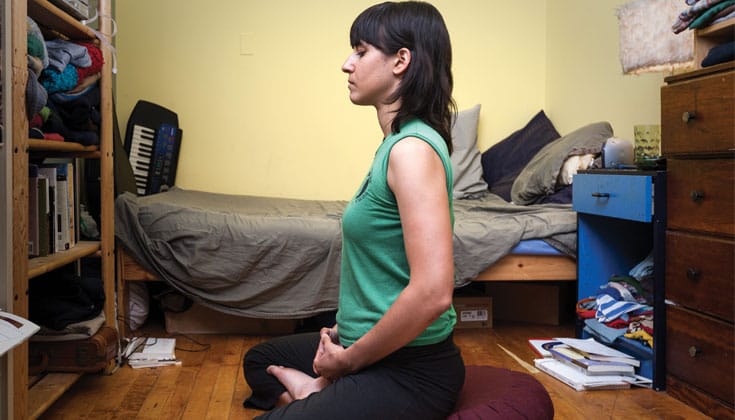One of the most frequently asked questions about meditation is, “What do I do about my thoughts?” How to work with your thoughts is one of the biggest challenges in meditation—and in life.
We hear a lot about meditation practice as something that opens us to a place of deep stillness and inner quiet. But your own experience might come closer to rocking back and forth between thinking, worrying that you shouldn’t be thinking, and struggling to get to some place where your thinking just drops away.
As an old teacher of mine once put it, “Unless you’re brain dead, you’re going to have thoughts.” Since you come to the cushion with the mind you have, thoughts, feelings, and perceptions will likely be present in your meditation. It is your relationship to them, and your awareness of their place in your meditation, that will shift as you deepen our practice.
Remember that nothing comes from outside of the mind. The mind includes everything; this is the true understanding of the mind.
You can let go of the idea of engaging in battle with your thoughts. You don’t need to force anything. If you refrain from trying to stop your thinking process, you allow it to stop by itself. When a thought comes into your mind, whatever it might be, let it come into your mind. It is just a thought. Then release it. You don’t have to follow it or pursue it. Your mind will begin to calm down.
Remember that nothing comes from outside of the mind. The mind includes everything; this is the true understanding of the mind.
As spectators watching ourselves, we constantly check to see whether or not we’re doing well. We want feedback on our progress. We might ask ourselves every few moments: “Am I doing all right? Am I meditating correctly? Am I getting somewhere?” Part of us seeks reassurance that we’re on the right track and that the time and effort we’re investing is making a difference. We compare ourselves to an idea/ideal we hold in our imagination. But that constant comparison keeps us from simply being in the moment.
What happens if we drop the role of spectator? Perhaps we worry that if we let go of our thinking, watching, judging overseer, then we won’t know if we are advancing in our practice. It’s true—we won’t—and that’s a good thing.
While you are following the breath, drop the notion of “I am breathing.” Focus on the inhale, and count “One,” then focus on the exhale, and count “Two.” Let go, again and again, and be present to whatever is real in that moment. Nothing more. Absolutely no thinking required.

